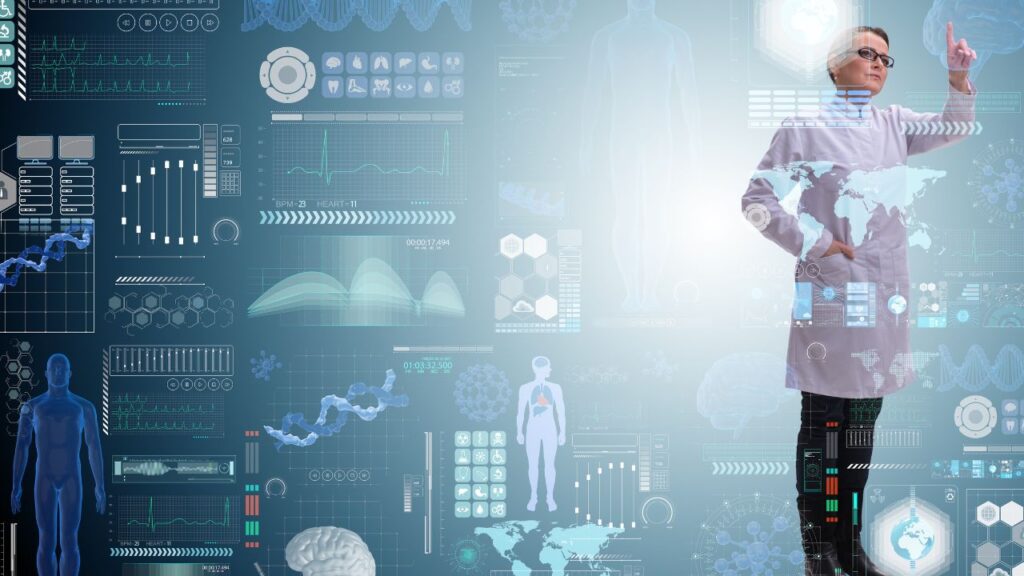
The future of diagnostics and patient care is being reshaped by technology and innovation. One of the most promising driving forces behind this change is artificial intelligence (AI). By integrating AI into healthcare, we can pave the way for more efficient and precise diagnostics, ultimately revolutionizing patient care. Let us delve into the advancements in AI-Powered healthcare diagnosis and how they are transforming the healthcare landscape.
The Need for AI in Healthcare
With an increasing demand for healthcare services and a limited number of medical professionals, AI solutions are stepping in to fill the gap. Patient data is growing exponentially, and complex cases with multiple factors require sophisticated analysis. AI’s ability to process large amounts of data, learn from existing patterns, and provide accurate predictions is exactly what healthcare professionals need to enhance diagnostic accuracy and improve patient outcomes.
Diagnostics and Detection
One of the key applications of AI in healthcare is image analysis. With the ever-increasing number of medical images generated from diagnostic tests like MRIs, CT scans, and X-rays, it becomes vital for radiologists to be as accurate and efficient as possible. AI-based algorithms can analyze these images faster and more accurately than human professionals, reducing the risk of misdiagnosis and allowing informed decisions to be made about a patient’s care. One significant aspect of medical imaging is the use of MRI with or without contrast. This technique helps radiologists to get a clearer view of the internal structures, resulting in better diagnosis and decision-making.
Diagnosing health issues in their early stages is paramount to successful treatment and recovery. AI can identify patterns and anomalies from various data sources such as electronic health records (EHRs), genetic data, and imaging, which can lead to the early detection of diseases. This can empower doctors to implement preventive measures or early-stage interventions, significantly improving patient outcomes.
Meeting Individual Needs
AI’s ability to process and understand vast amounts of patient data opens the door to personalized healthcare. By leveraging genetic information, lifestyle choices, and EHRs combined with AI algorithms, doctors can deliver tailored treatment plans that cater to the specific needs of each patient. This holistic approach to patient care sees the individual as a unique case, rather than adopting a one-size-fits-all mindset.
For patients who are geographically isolated or have limited access to healthcare facilities, AI-powered telemedicine can be life-changing. By offering remote consultations with healthcare professionals and utilizing AI algorithms for diagnostic support, patients can receive quality healthcare without stepping foot outside of their homes. This increases accessibility and opens up opportunities for patients to seek second opinions from specialists across the globe.
Applications in Different Areas
AI also has the potential to improve mental health care by enabling early detection and risk prediction for various mental health disorders. By analyzing language, speech, and behavior patterns, AI algorithms can aid in the diagnosis of conditions such as depression and anxiety. This technology can provide remote support, triage, and treatment suggestions, which complement the care provided by mental health professionals, enabling more efficient resource allocation and improved outcomes for patients.
In addition to diagnostics, AI is also revolutionizing surgical procedures by assisting surgeons in identifying critical structures and planning surgical approaches. AI-enabled surgical navigation and robotics systems can provide real-time guidance during surgery, improving accuracy, reducing complications, and shortening recovery times. The integration of AI in surgical procedures offers the potential for more personalized and optimized surgical interventions, leading to better patient outcomes.
Challenges and the Future
While AI offers abundant benefits to the healthcare sector, its seamless integration remains a challenge. Data privacy and security are critical concerns that need to be addressed as sensitive patient information is being used to train the AI algorithms. Additionally, training AI models requires a diverse and substantial dataset to reduce biases and inaccuracies. Lastly, legal and regulatory frameworks must adapt to accommodate this new technology and determine liability in the case of errors or malpractice.
As healthcare becomes increasingly interconnected, the power of AI will continue to expand. Soon, we may see advanced AI-powered platforms that can predict disease progression, analyze lifestyle factors, and provide real-time support for both patients and healthcare providers. As we overcome the challenges associated with AI’s integration in healthcare, we can look forward to a future in which technology revolutionizes the way healthcare is delivered, providing a more efficient, personalized, and accessible experience for patients worldwide.
Conclusion
AI-powered diagnostics have the potential to revolutionize patient care from early detection to personalized treatment. By embracing this technology and overcoming its challenges, we can make healthcare more efficient, accurate, and accessible. The future is bright for AI-driven healthcare, and we’re only just beginning to scratch the surface of what it can achieve.

Lifebing is driven by an unrelenting passion for promoting health and well-being, our team is wholly committed to curating exceptional content and immersive experiences.
